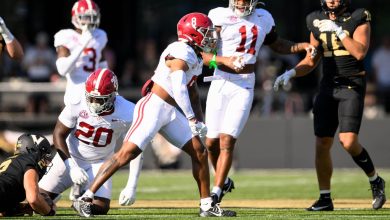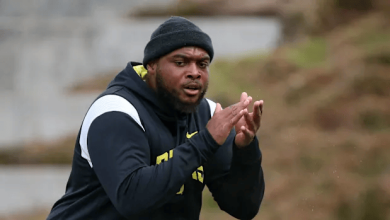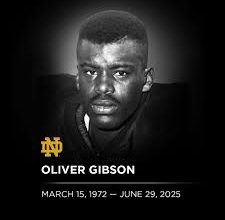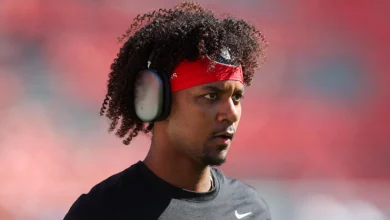Champ Bailey, a UGA legend, favors cannabis over “old-school methods” for healing.
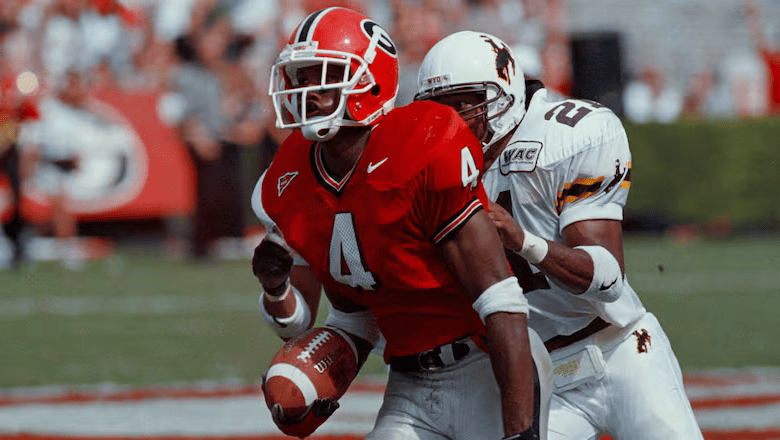
Champ Bailey, one of the most iconic figures in Georgia football history, has not only left a mark on the field but also continues to influence the world off it. The All-American cornerback, known for his incredible athleticism, lockdown defense, and leadership during his time at the University of Georgia (UGA), is now using his platform to advocate for a cause that may surprise some fans: the use of cannabis in healing and recovery, especially for athletes.
As a celebrated figure who is often synonymous with excellence on the football field, Bailey’s shift towards cannabis advocacy is particularly significant. In a world that has traditionally embraced painkillers, ice baths, and other “old-school methods” to heal from the wear and tear of professional sports, Bailey’s endorsement of cannabis represents a revolutionary and often controversial stance.
This article explores how Champ Bailey’s views on cannabis align with a broader trend in professional sports and wellness, his personal journey with the plant, and how his perspective could help reshape the way athletes think about pain management and recovery in an era of increasing acceptance of cannabis.
The Athletic Journey of Champ Bailey
Before delving into Bailey’s advocacy for cannabis, it’s essential to take a step back and recognize why his voice carries weight. Champ Bailey, originally from Washington, D.C., played for the University of Georgia Bulldogs from 1996 to 1998, where he quickly established himself as one of the most talented defensive backs in college football. His performances were nothing short of spectacular, and his skills earned him All-American honors, culminating in his selection as the 7th overall pick in the 1999 NFL Draft by the Washington Redskins.
Bailey’s 15-year career in the NFL was filled with accolades. As a member of both the Washington Redskins and the Denver Broncos, he became one of the best cornerbacks in the history of the game. His career included 12 Pro Bowl selections, three First-team All-Pro honors, and induction into the Pro Football Hall of Fame in 2020. Known for his agility, football IQ, and ability to shut down wide receivers, Bailey’s contributions on the field were immense.
However, like many athletes, Bailey’s long and storied career came with its share of injuries. Playing in the NFL, where the physical demands of the sport are as high as they come, meant enduring countless bumps, bruises, and more significant injuries over the years. These physical challenges led Bailey to explore alternative methods for recovery and pain management.
The Shift Toward Cannabis as a Healing Agent
In an era where pain management was traditionally handled with anti-inflammatory drugs, opioid painkillers, and muscle relaxants, Bailey began to seek out alternatives as he experienced the wear-and-tear effects of his career. While many athletes, particularly those in contact sports like football, have long relied on prescription medications to deal with injuries, Bailey discovered cannabis as a safer, natural alternative.
Bailey has expressed that, unlike the “old-school methods” of recovery—methods that often included highly addictive opioid prescriptions—cannabis has helped him find a more holistic and sustainable approach to healing. With its powerful anti-inflammatory properties, cannabis has been known to help relieve pain and promote recovery without the side effects often associated with pharmaceuticals. Bailey’s embrace of cannabis reflects a broader shift within professional sports towards understanding the plant’s therapeutic potential.
The Healing Properties of Cannabis
Cannabis, often dismissed or stigmatized in the past, has slowly begun to be recognized for its medicinal properties. In recent years, there has been growing support for cannabis use among athletes due to its ability to alleviate pain, reduce inflammation, improve sleep, and aid in muscle recovery—all of which are critical to an athlete’s recovery and performance.
Research has shown that compounds found in cannabis, primarily tetrahydrocannabinol (THC) and cannabidiol (CBD), can be beneficial for managing pain and inflammation, conditions that athletes frequently battle. THC, the psychoactive component in cannabis, has been associated with pain relief and mood enhancement, while CBD, the non-psychoactive component, has become especially popular for its ability to reduce inflammation, anxiety, and even promote neuroprotection.
Bailey himself has spoken about how his personal experience with cannabis, particularly CBD, helped him find relief from the chronic pain he dealt with during and after his playing career. He’s also mentioned that his use of CBD allowed him to avoid the addictive side effects associated with prescription opioids, which have been a concern among many former athletes in various professional sports leagues.
The effectiveness of cannabis as a recovery tool can be particularly important for football players like Bailey, whose bodies endure constant physical stress. From concussions to torn ligaments and fractures, the injuries suffered by football players often come with long-lasting consequences. For Bailey, the shift away from traditional painkillers toward cannabis-based products seems to have been a life-changing decision, one that could ultimately change the way athletes view pain management and recovery.
Breaking the Stigma: Champ Bailey’s Advocacy
While many athletes are embracing cannabis for recovery, it’s important to understand the significant shift in cultural and societal views that Bailey is helping to foster. For decades, the use of cannabis was heavily stigmatized, especially in professional sports. Athletes feared being banned or suspended for using the substance, given its prohibition by most leagues, including the NFL.
However, over the past decade, there has been a notable change in the attitude toward cannabis in sports. As more states have legalized medical and recreational cannabis, more athletes have come forward to share their positive experiences with the plant. The National Football League (NFL), for example, has softened its stance on cannabis use in recent years. In 2020, the NFL announced that it would relax its policies regarding marijuana use, allowing players to use cannabis for pain relief and recovery purposes without facing punishment. This has helped to pave the way for more athletes, like Bailey, to be open about their cannabis usage.
For Bailey, advocating for cannabis is about more than just personal healing. It’s about helping other athletes avoid the dangers associated with opioid use and providing a healthier alternative. He believes that cannabis could change the way athletes approach injury recovery and that its acceptance in sports culture could lead to healthier outcomes for generations of athletes.
Bailey’s openness about using cannabis for healing purposes is significant because it comes from one of the most respected and admired figures in football. His decision to publicly support cannabis use helps reduce the stigma surrounding the plant, not just for athletes but for the general public as well. By taking a stand, Bailey is influencing not only athletes but also a broader movement in the fight for cannabis legalization and de-stigmatization.
The Larger Impact of Cannabis in Sports Culture
Bailey’s stance is part of a growing movement of athletes in various sports leagues—NBA, NFL, NHL, and even Olympic sports—who are advocating for the use of cannabis as a healing and recovery tool. Athletes are increasingly using CBD and THC products to relieve chronic pain, manage stress, and promote overall health and well-being.
The significance of these developments lies in the potential for cannabis to revolutionize recovery methods, especially in a world where athletes face pressure to perform at the highest levels year after year. Many professional athletes, like Bailey, view cannabis not only as a way to treat pain but as part of a more comprehensive approach to physical and mental wellness.
As the NFL and other leagues continue to shift toward more progressive attitudes on cannabis, it is likely that more athletes will follow in Bailey’s footsteps and publicly embrace its benefits. With professional sports leagues potentially expanding their endorsement of cannabis, the stigma surrounding it will likely dissipate even further, leading to greater acceptance and a broader conversation about its place in athletics.



